College Sports
Grace in Motion and Melody: William & Mary Gymnast Balances Beam and Bach
William & Mary gymnast Summer Penzi balances gymnastics with violin and piano. (Summer Penzi) WILLIAMSBURG — William & Mary gymnast Summer Penzi knows all about balance; whether it be the balance beam or balancing her academic schedule while finding time to practice her flips and fugues. Penzi began competing in gymnastics at the age of […]
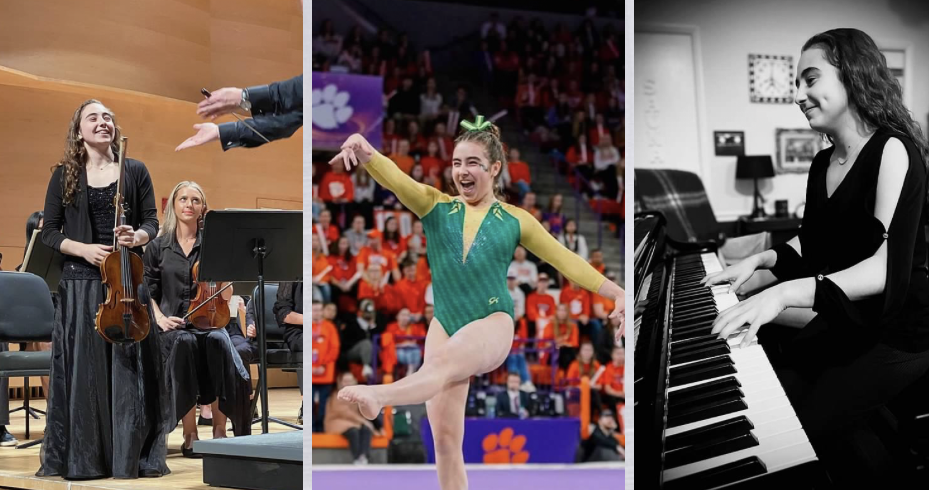

WILLIAMSBURG — William & Mary gymnast Summer Penzi knows all about balance; whether it be the balance beam or balancing her academic schedule while finding time to practice her flips and fugues.
Penzi began competing in gymnastics at the age of eight. When she began her training in level seven, Penzi met a Russian Olympic Coach who rubbed off on her.
“The perfectionism and desire to be the best really helped me rise to the top of my sport,” Penzi said.
That perfectionism ultimately led to a setback during college recruitment, however.
“She refused to take me to regionals and nationals during my sophomore year. Even after I had qualified. I believe that you have the power to write your own story, so I took matters into my own hands. I switched gyms my junior year, doing everything I could to salvage my recruiting potential,” Penzi said.
After sending countless recruitment videos and attending tons of college camps, Penzi met with the William & Mary coach at the national gymnastics competition.
“They told me that they really liked what they saw and wanted to stay in touch. I was finally offered a spot during the summer after my junior year of high school, and I really couldn’t have been happier,” Penzi recalled.
While flipping and twisting was her physical outlet, her emotional outlet comes through music. At the age of 11, Penzi auditioned for The Juilliard School, one of the most prestigious music schools in the world.
“I made it through the first round of auditions, which I felt was a huge milestone that I’m proud of, especially knowing that about 10% of applicants advance that far,” Penzi said.
She’s also won the Forte International Music Competition two years in a row. Her performances have taken place at both Carnegie Hall and Lincoln Center. Penzi also won “Long Island’s Got Talent.”
“One of the most meaningful parts of my journey has been using music to lift up others. During high school, I played for patients at a regional hospital and it put a smile on my face seeing the spark of happiness I could bring to their day, no matter what they may be going through. It just gives me joy,” Penzi said.
Penzi has achieved the rank of concertmaster in every level of orchestra. She also won a concerto competition while in high school and got to perform her winning piece with a full orchestra behind her at Lincoln Center.
Combining her love for music and sports, Penzi also creates her own floor exercise music for all of her gymnastics competitions.
According to Penzi, it all takes balance.
“I like to equate it to being a juggler in a circus. That’s basically me, balancing academics, gymnastics, piano, violin. I’ve always just kept myself organized by writing out a schedule, prioritizing my activities on a daily basis. I try to take each day, recognize what needs my attention the most in that moment, and adjust accordingly. Sometimes events overlap and it’s definitely tricky, but I’ve always found a way to make it work,” Penzi said.
Penzi, a rising junior at William & Mary, also believes heavily in helping the young gymnasts of tomorrow become better athletes. She recently signed on with a sports organization to serve as a mentor to young gymnasts.
She’s also spending part of her summer coaching at a gymnastics camp in Tennessee.
“Every challenge, every late night, every moment of doubt has been worth it. My parents always pushed me to be my best and have really shown me what it means to be dedicated and determined. Their belief in me was the foundation of everything. Keep pushing when it’s hard because you are way stronger than you think you are,” Penzi said.
Penzi often posts music and gymnastics content on her Instagram. Follow her here.
College Sports
Steve Spurrier is still taking shots at Kentucky
Steve Spurrier has spent his life scoring points and taking shots at opponents. The Old Ball Coach turned Florida into a college football force, and pissed off a lot of people along the way. He has a way of turning a seemingly straightforward statement into a passive-aggressive barb, and that has not changed since he […]
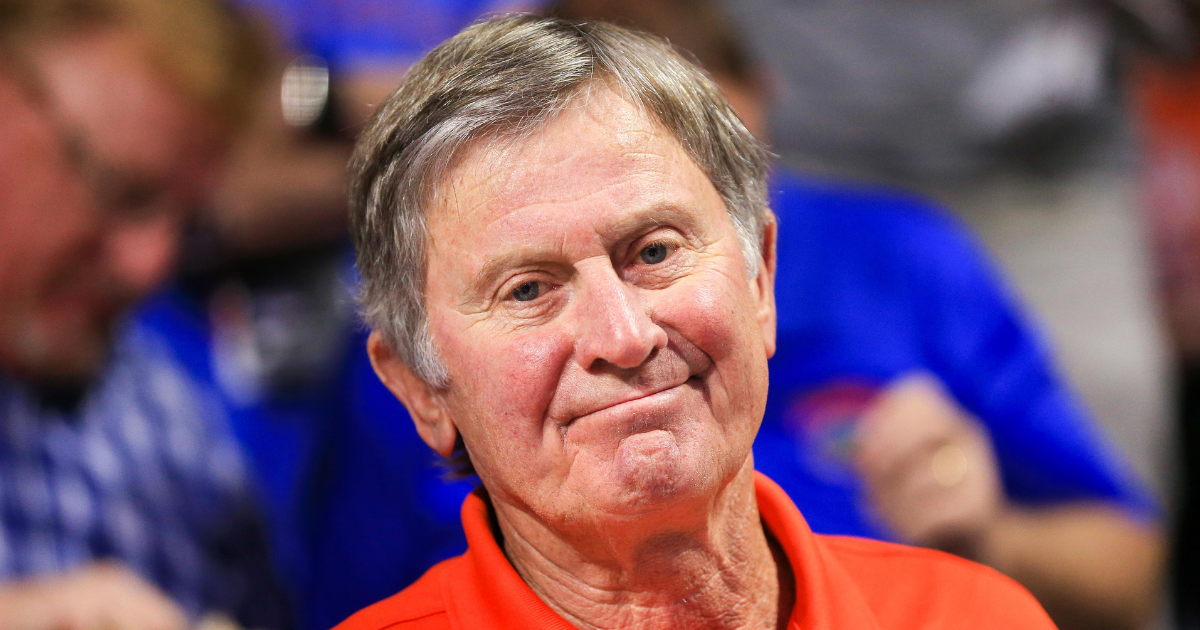
Steve Spurrier has spent his life scoring points and taking shots at opponents. The Old Ball Coach turned Florida into a college football force, and pissed off a lot of people along the way. He has a way of turning a seemingly straightforward statement into a passive-aggressive barb, and that has not changed since he stepped away from the sidelines.
It took Kentucky almost 20 tries before the Wildcats finally defeated Spurrier in 2010. One loss to the Wildcats didn’t force Spurrier to pull any punches. After a 54-3 blowout win over Kentucky in 2011, Spurrier said, “Kentucky has a heck of a punter, I know that.”
Kentucky forced Spurrier into early retirement. The Wildcats beat South Carolina in consecutive seasons. Four weeks after a 26-22 defeat at Williams-Brice Stadium, Spurrier abruptly announced he was stepping away from the program.
The Old Ball Coach is spending his retirement life as an advisor for the Florida Gators. He can’t stay away from a microphone, speaking regularly on Pat Dooley’s podcast.
During this week’s show, Kentucky was a topic of conversation. The Wildcats just successfully flipped wide receiver Denairius Gray from Auburn, who was the third four-star talent Hugh Freeze lost in ten days.
“Kentucky fans are pointing out that their coach doesn’t play golf,” Pat Dooley pointed out on Another Dooley Noted Podcast.
“Kentucky?” Spurrier interjected. “They don’t have a lot of wins to brag about right now.”
I feel partially to blame for this stray from the Old Ball Coach. In late June, AL.com took a closer look at Hugh Freeze’s golf game following the rash of decommitments and found that Freeze was logging more scores than any other coach in the SEC. They also pulled Mark Stoops’ scores from Lexington Country Club, where he only played two 18-hole rounds in the month of May. It led me to make a quip, “Mark Stoops is too motivated to play golf.” Deputy Doofus ran with it, and now the joke has entered Spurrier’s crosshairs.
Let Spurrier make all the jokes he wants from the sidelines. It’s only going to give Mark Stoops one more reason to be motivated ahead of the 2025 season.
Sign up for the KSR Newsletter to receive Kentucky Wildcats news in the most ridiculous manner possible.
College Sports
‘We don’t know the rules’ — Big 12 coaches still wrestling with new world order after player payment changes
FRISCO, Texas — Within a small booth three stories above the practice field of the Dallas Cowboys, Kenny Dillingham crosses his legs, leans back in a swivel chair and details exactly what’s happening across the current college football recruiting landscape. “We don’t know the rules,” the Arizona State head coach says. “The settlement passed, but […]
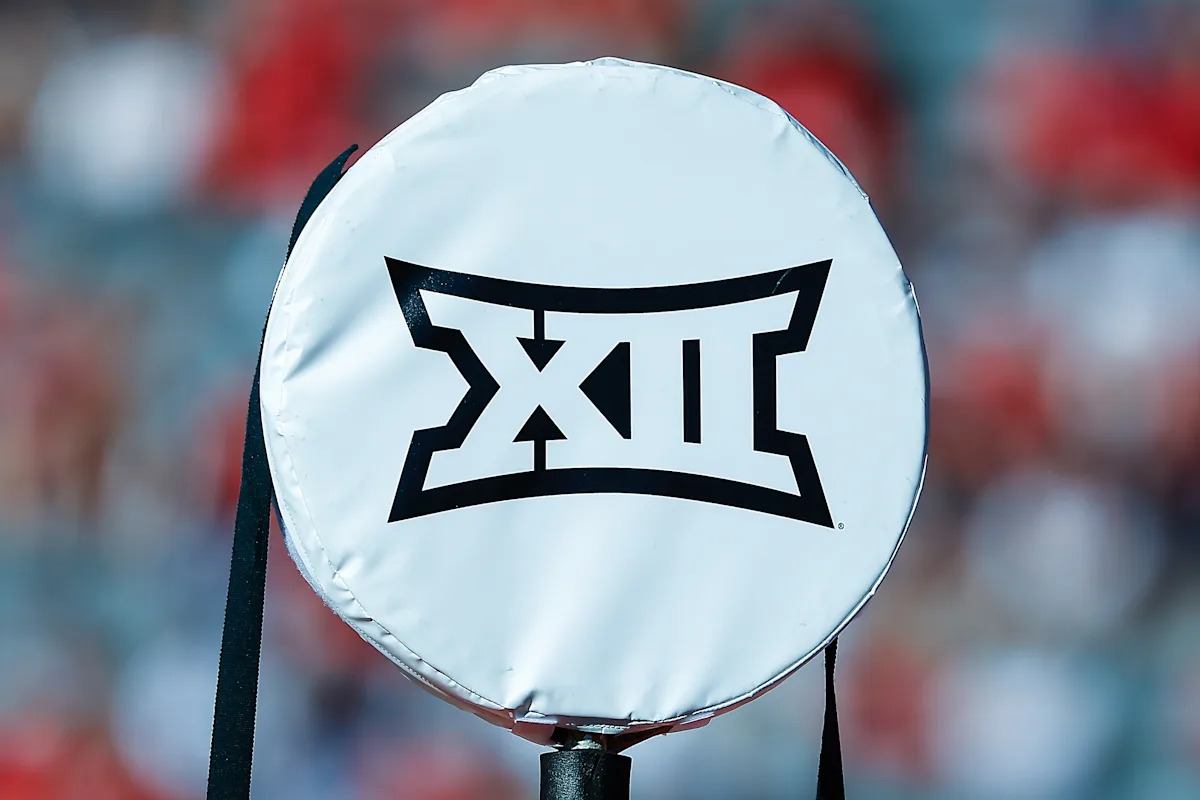
FRISCO, Texas — Within a small booth three stories above the practice field of the Dallas Cowboys, Kenny Dillingham crosses his legs, leans back in a swivel chair and details exactly what’s happening across the current college football recruiting landscape.
“We don’t know the rules,” the Arizona State head coach says. “The settlement passed, but who knows what Deloitte is going to clear. Until there is clarity, you’re living in limbo.”
Advertisement
And there’s something else.
“You are seeing a lot of people lie and promise fake things,” he says.
The Big 12 on Tuesday kicked off three weeks of conference football media days from the Cowboys’ domed practice facility just north of Dallas, its head coaches, administrators and players jaunting across the turfed field to various media stations on Day 1 of a two-day event. It unfolded in front of a backdrop of what happened a week ago: the implementation of the NCAA’s historic settlement of an antitrust case — a move that has ushered in direct athlete-revenue sharing.
A similar theme emerged from the eight head coaches here Tuesday, one likely shared by the eight others who get their turn Wednesday: The Wild West, they say, remains wild.
Advertisement
The finger pointing has already begun.
Schools are making big enough contract offers to recruits that they cannot possibly remain under college football’s new compensation cap, some coaches believe. Others are guaranteeing third-party NIL deals as part of the total compensation package to athletes — something against new revenue-share rules.
A few are doling out cash from their collectives to high school players in an attempt to induce their commitment — also against new rules. And those schools rich enough to have front-loaded millions of dollars in the spring to compensate this year’s roster — while perfectly within the rules — now hold an advantage in building next year’s roster.
“I don’t understand what rules everybody is playing by,” Cincinnati head coach Scott Satterfield says. “The whole point of this was for us all to be playing by the same rules, but we are not. We are not playing by the same rules, particularly this past spring when everybody is apparently front-loading where others are having to now spend their [revenue-share] cap.”
The Big 12 and its coaches aren’t alone in complaining about the new system after the House settlement. (Kevin Abele/Getty Images)
(Icon Sportswire via Getty Images)
Meanwhile, the newly minted entities charged with enforcing these policies, the College Sports Commission and its Deloitte-run NIL clearinghouse, are bogged down in legalities tethered to the settlement, those familiar with the process tell Yahoo Sports. In fact, dozens and potentially hundreds of submitted third-party NIL deals — some, perhaps, from booster collectives — remain under review as college leaders negotiate with House plaintiff lawyers over a final set of cap-circumvention rules and penalties. Plaintiff lawyers, most notably co-lead attorneys Jeffrey Kessler and Steve Berman, hold authority and approval rights to a variety of settlement enforcement concepts, including rules and penalties that, in the end, are likely to determine final decisions from the College Sports Commission.
Advertisement
These rules identify a variety of possible ways schools may attempt to circumvent the cap, including the guaranteeing of third-party NIL compensation in offers to athletes, NIL contracts struck with those in high school and particulars around the NIL clearinghouse’s primary enforcement mechanisms for booster-backed contracts — that they are required to be within a “fair market-compensation range” created by Deloitte and must be for a “valid business purpose.”
Contacted this week, Kessler told Yahoo Sports that attorneys are working with major conference administrators to finalize the approval of what some term as “anti-circumvention” or “gamesmanship” rules.
How new NIL deals are processed
In the meantime, certain submitted NIL deals remain in limbo. That doesn’t go for all of them.
Advertisement
Of the more than 1,200 deals submitted to the clearinghouse so far, about one-third have been approved — many of them with little to no issue, those with knowledge tell Yahoo Sports. About 80 have been denied and are likely, if they haven’t already, to be resubmitted (deals can be resubmitted once).
Kessler says that no deals have advanced past the second denial stage and into the appeals phase, where athletes present their case before a neutral arbitrator. College executives and attorneys are finalizing a group of eight arbitrators — many of them former judges, Kessler says — to serve as an independent arbitration group.
As college administrators and attorneys embroil themselves in legal negotiations, football coaches and general managers are preparing for the first-ever Aug. 1 official NCAA “offer date,” when schools can formally offer revenue-share contracts to prospects (some have already, informally).
On the recruiting trail across the country, Big 12 coaches say they are witnessing schools finding new ways, in the revenue-share era, to circumvent the cap and skirt the rules — perhaps even in their own league.
Advertisement
“I’ve seen these agents coming out and saying, ‘It’s a guaranteed three-year deal for a high school kid.’ One in our league right now,” Satterfield said. “How?”
Said UCF head coach Scott Frost: “Only comment I have is about some of the offers going out to freshmen. Those people must not be planning on there being a cap because they wouldn’t be able to spend that.”
How do schools use front-loading?
In what’s been no secret, Texas Tech has used riches to fuel what’s become a recruiting juggernaut. The athletic program has spent more than $50 million on its athletes in both front-loaded money this past spring plus revenue-share dollars this coming academic year. That’s at least the front-loading of $30 million plus $20.5 million in rev-share.
Advertisement
Front-loading refers to the literal loading upfront of player contracts as school collectives paid out all or a majority of deals before the settlement’s implementation date of July 1. Deals paid out on July 1 and after are subject to the new enforcement system specifically created to prohibit booster and collective compensation.
Joey McGuire, the Texas Tech head coach, describes his recruiting approach as the byproduct of high-level university support, careful planning and an “aggression” that all schools should be taking to compete with the bluebloods of college football.
“What we do as a conference is so important, but we also got to do it off the field,” he told Yahoo Sports in an interview. “We’ve got to recruit at this level if we are going to continue to be in the same conversation as the SEC and Big Ten. We’ve got to understand as a conference that we’ve got to commit to that. We have committed to that at Texas Tech and eliminated any people saying, ‘Well, they can’t do it there.’”
They are far from alone in front-loading. Booster collective spending on athletes in June was more than 800% higher than last June, according to Opendorse, an NIL platform used by dozens of collectives. According to another NIL platform, Teamworks, collectives distributed a whopping $71 million to athletes in June using their system.
Advertisement
“When you front-load, that gives you the ability to have money in the rev-share this year to make big-time payments and close out guys,” says Baylor head coach Dave Aranda. “That’s what I’m seeing right now. There’s a fair amount in our league that did it. There are a couple of schools here today.”
There is a downside, Dillingham says.
“Most places are so win now and most coaches aren’t at a place they want to stay at,” he said, “Either you’re at the top, and it’s win now or as long as you can. Or you’re at a place where it’s win now and you can leave and get out. The front-loading allowed coaches to win now to take another job.
“But at the end of the day, all these people who front-loaded, eventually, you’re gonna have to tell players they have to take less. You may have set a standard for what people should be paid. Your starters may expect a certain amount of money when in reality they cannot functionally earn that amount of money if you want to build a team.”
Advertisement
All of that, of course, is contingent on the College Sports Commission and Deloitte-operated NIL clearinghouse policing deals strictly enough.
“I don’t know how Deloitte is going to act,” Dillingham said, “but I know there are some future challenges where people don’t get the money that they were told they’d get.”
Kansas State head coach Chris Klieman didn’t have the luxury to front-load, he said.
“There are schools [that will] have $50 million rosters,” Klieman said. “You can’t be mad about it because it was legal, but that’s why this first year will be interesting once we end the season. What will happen moving forward? That’s where it’s going to get really interesting. That’s what we are concerned about: How do we reel this in? Is Deloitte going to really stay on top of that?”
Advertisement
Big 12 commissioner Brett Yormark, one of the people intimately involved in decisions around the new enforcement entity, holds confidence that the system will work.
“In theory, the settlement should create a more level playing field and enforcement will effectively determine if that’s the case or not,” he told Yahoo Sports. “I think the onus is on the commissioners to reinforce that there needs to be a change in behavior.”
So what’s next?
Already, there are cap-circumvention issues emerging in contracts and promises made to athletes.
For instance, at SEC spring meetings in May, Georgia head coach Kirby Smart told Yahoo Sports that schools are promising high school recruits and transferring players third-party NIL deals as part of their compensation package despite an important fact: None of those deals have been approved by the clearinghouse.
Advertisement
Some school-affiliated booster collectives are currently compensating high school players — upward of $20,000 a month — to remain committed and eventually sign with their school, Smart and other coaches say.
Dillingham said he’s seen contracts that also permit schools to end or reduce a player’s salary over the course of the deal, something reported earlier this spring by Yahoo Sports via Illinois law professor Michael Leroy, who uncovered more than 90 different player contracts through open-records requests.
“These NIL contracts read like employee handbooks that reserve a right of employment at will for employers,” he said. “They don’t use ‘at will’ but the concept is, they can terminate the contract.”
In one ACC revenue-share contract obtained by Yahoo Sports, the school includes in the total compensation to the player a figure for “NIL” of $25,000 annually. Next to that figure is a line: “Subject to the Deloitte Clearinghouse.”
Advertisement
“You don’t know if your NIL collective deals will go through and the school can change your rev-share dollar amount at any time,” Dillingham said. “Well, then what are we actually doing?!”
Many coaches are asking that question and plenty more.
Asked Tuesday if he’s heard feedback from the NIL clearinghouse, Frost smiled: “No. Have you?”
College Sports
Report: Tennessee State not fielding men’s hockey team for 2025-26, aiming to move start to 2026-27 – College Hockey
After it was first announced in June 2023 that Tennessee State would field an NCAA Division I men’s hockey team for the upcoming 2025-26 season, it appears that will not happen. According to a report in the Tennessean, “uncertainty about a home ice location or practice facilities, a lack of fundraising, and unrest about the […]

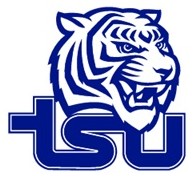 After it was first announced in June 2023 that Tennessee State would field an NCAA Division I men’s hockey team for the upcoming 2025-26 season, it appears that will not happen.
After it was first announced in June 2023 that Tennessee State would field an NCAA Division I men’s hockey team for the upcoming 2025-26 season, it appears that will not happen.
According to a report in the Tennessean, “uncertainty about a home ice location or practice facilities, a lack of fundraising, and unrest about the school’s financial situation are all contributing factors for the delay of the program.”
Tennessee State would have been the first-ever hockey team at an historically black, public university. It now appears that 2026-27 will be the earliest the Tigers will take the ice.
A source with knowledge of the situation, who wished to remain anonymous because the news has not been made official, told the paper that Tennessee State’s hockey team had not met its fundraising goals for 2025-26.
Duanté Abercrombie was named the Tigers’ inaugural coach in April 2024.
College Sports
McKenna, projected No. 1 pick in 2026, announces he will play at Penn State
Penn State (22-14-4) reached the Frozen Four for the first time last season after defeating Connecticut 3-2 in overtime to win its regional final. It lost 3-1 to Boston University in the national semifinals. The program moved to the NCAA Division I level for the 2012-13 season and has made a rapid ascent. “I think […]

Penn State (22-14-4) reached the Frozen Four for the first time last season after defeating Connecticut 3-2 in overtime to win its regional final. It lost 3-1 to Boston University in the national semifinals.
The program moved to the NCAA Division I level for the 2012-13 season and has made a rapid ascent.
“I think it’s just a lot of work from a lot of people in the hockey program and the athletic department and the community, the alumni,” Penn State coach Guy Gadowsky said. “So many people that have been doing a lot of work for the program since its inception. I guess it’s just the law of the farm that you keep doing the job, and eventually you get rewarded for it.”
McKenna said another of the aspects that swayed him was the facilities for the players, which are housed at Pegula Ice Arena. The building is named for Buffalo Sabres owner Terry Pegula.
“It’s all hockey all the time,” Gadowsky said. “This building is for them. … I’ve never seen a better hockey weight room, and it’s literally, it’s 10 feet across the hall from our locker room. They thought of making sure that we have great nutrition right in the locker room area, everything from the underwater treadmill and athletic training facilities right in the locker room. Everything is extremely convenient for the hockey players and that’s something that was important to Mr. Pegula.
“The atmosphere right from Day 1 was incredible, and as we’ve improved, they’ve improved. This is the most fun place to watch a hockey game, that’s for sure.”
McKenna will have help this season. Defenseman Jackson Smith, selected by the Columbus Blue Jackets with the No. 14 pick of the 2025 NHL Draft, will join McKenna as a freshman. The 18-year-old was 10th among WHL defensemen last season with 54 points (11 goals, 43 assists) in 68 games with Tri-City.
Among the returning players from last season will be the team’s top two scorers, forwards Aiden Fink and Charlie Cerrato.
Fink, a Nashville Predators prospect, was fourth among NCAA players with 53 points (23 goals, 30 assists) in 40 games. Cerrato, who had 42 points (15 goals, 27 assists) in 38 games, was chosen by the Carolina Hurricanes in the second round (No. 49) of the 2025 NHL Draft. He’s the second-ever Penn State player to be chosen in the NHL draft, and first since Denis Smirnov by the Colorado Avalanche in the sixth round (No. 156) of the 2017 NHL Draft.
In addition, Gadowsky was a finalist for the Spencer Penrose Award as NCAA Division I coach of the year.
“The main goal is obviously to win a championship,” McKenna said. “I think you kind of saw what Penn State did this year, making it to the Frozen Four. They’ve come a long ways, and I think next year when I go there, obviously that’s the goal, to win a championship with them.”
Other players selected in the 2025 draft committed to play NCAA hockey this season include forward Cole Reschny (No. 18, Calgary Flames), who is leaving Victoria of the WHL for the University of North Dakota; and forward Malcolm Spence (No. 43, New York Rangers), who is going to the University of Michigan from Erie of the Ontario Hockey League.
Defenseman Keaton Verhoeff, another top prospect for the 2026 draft, will attend North Dakota after playing the past two seasons with Victoria.
NHL.com senior draft writer Mike G. Morreale contributed to this report
College Sports
Michigan State hockey losing star player after NHL trade
This past season, Michigan State hockey had the top player in all of college hockey, Isaac Howard, who won the Hobey Baker award for what many thought would be one last ride. After a trade on Wednesday between the Tampa Bay Lightning and the Edmonton Oilers, Howard will be leaving East Lansing after all. It […]
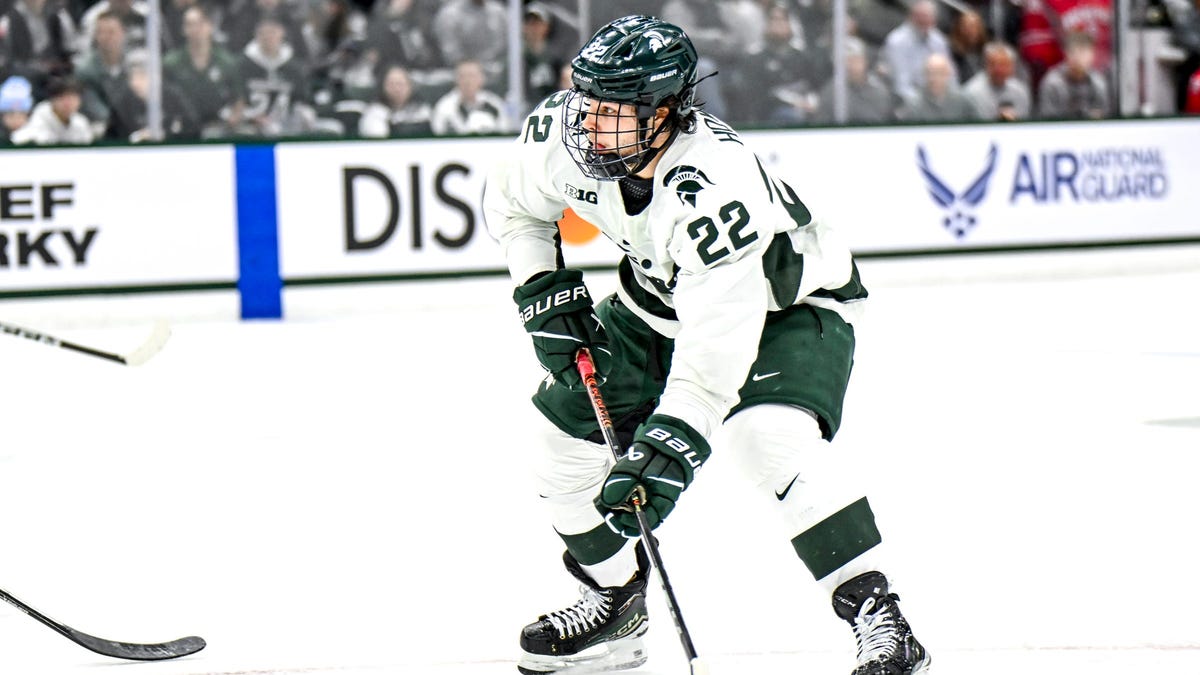
This past season, Michigan State hockey had the top player in all of college hockey, Isaac Howard, who won the Hobey Baker award for what many thought would be one last ride. After a trade on Wednesday between the Tampa Bay Lightning and the Edmonton Oilers, Howard will be leaving East Lansing after all.
It was a fairly shocking surprise when Howard announced he would return to the Spartans for one more year back in April. At the time, there was some friction between Howard and Tampa Bay, who had drafted him in the first round of the 2022 NHL Draft, and Howard cited a ‘philosophical divide’ between him and the Lightning as a major reason he would return to MSU.
Now, Howard is in Edmonton, and he signed a three-year contract to start his professional career with the Oilers. While this marks the end for Isaac Howard with MSU, Spartan hockey fans can at least be consoled by the fact that Trey Augustine, one of the best goaltenders in college hockey, will be delaying his pro career and staying with MSU for one more year.
Contact/Follow us @The SpartansWire on X, and like our page on Facebook to follow ongoing coverage of Michigan state news, notes, and opinion. You can also follow Andrew Brewster on Twitter @IAmBrewster.
College Sports
Running a Baseball League Sparked Sarah Dunkel-Jackson to Start the Hockey Challenge Camp
Sarah Dunkel-Jackson and her husband, Jim, started a baseball league in Michigan for kids with unique medical and learning needs five years ago. Intertwined with her work as a researcher and professor at Michigan State University, Dunkel-Jackson conducted a formal program evaluation of the league, which involved talking with players, parents and coaches about how […]

Sarah Dunkel-Jackson and her husband, Jim, started a baseball league in Michigan for kids with unique medical and learning needs five years ago.
Intertwined with her work as a researcher and professor at Michigan State University, Dunkel-Jackson conducted a formal program evaluation of the league, which involved talking with players, parents and coaches about how it could be improved.
“Overwhelmingly it was positive, but the thing to improve baseball was to add more sports,” Dunkel-Jackson said. “I was reviewing it with my son, and he said, ‘Mom, can we do hockey?’
“And I said, ‘You know what? Let’s do it.’”
That’s how the Hockey Challenge Camp was born. The camp is open to younger kids all the way up through young adults, some who’ve played hockey before on organized teams and others who are new to playing the sport. The camp takes players of all abilities and ages.
Dunkel-Jackson recently won the Willie O’Ree Community Hero Award for her work founding the camp. The annual award is given to someone who has positively affected their community, culture or society all through the sport of hockey.
The nomination itself excited Dunkel-Jackson because it gave her a chance to highlight the importance of accessible sports and a community coming together to run a program like Hockey Challenge Camp.
“It doesn’t have to be this scary, really difficult thing to do,” Dunkel-Jackson said. “You just get some really good community members together and some good organizations who share those values and who can run a program like this.”
She was also excited about the award because of the “incredible story” of O’Ree. Dunkel-Jackson recalled reading the chapter about him in Wayne Gretzky’s book, “99: Stories of the Game.”
“That was really cool to see that, somebody who’s already overcome barriers to accessing sports like hockey,” Dunkel-Jackson said. “Just to be said in the same sentence as him was kind of, ‘Wow,’ humbling and a big honor.”
Sports have always been a big part of Dunkel-Jackson’s life. She grew up right outside East Lansing, Michigan, and loved watching her little brother play hockey. However, she didn’t play because there weren’t girls teams when she was a kid.
Dunkel-Jackson ran track, played basketball, won a softball state championship her senior year of high school and played lacrosse in college.
After grad school, she and her husband moved to Ontario and worked with kids with disabilities. They later moved back to Michigan and Dunkel-Jackson got her job at MSU. She’s part of the Research in Autism and Developmental Disabilities Lab and the Department of Human Development and Family Studies.
As coaches for softball and baseball in the community program, the couple saw kids who’d stop coming to practices because they weren’t quite at the skill level. That sparked the need to start the Baseball Challenge League, finding a way to make the sport work for kids no matter their ability level.
“Being part of a team is something all kids should get a chance to do,” she said. “When we saw that not a lot of kids had the opportunity to participate in a sport because they just weren’t being able to adapt to their needs, I just wanted to do something about that. Every kid should have a chance to play.”
Dunkel-Jackson is also the guardian for her older cousin, Stephanie, who’s participated in the Special Olympics, plays a variety of sports and is a bocce ball state champion.
This year’s Hockey Challenge Camp will be held mornings in the first week of August. Every participant gets one or two hockey buddies who play hockey on house or travel teams. Buddies help campers learn to skate and spend time on the ice together.
The camp includes various on-ice and off-ice sessions. The first is for the hockey buddies as an orientation to educate them about questions such as: What is a disability? What are invisible and visible disabilities? How can they help campers and meet them with their specific needs? They also teach them a Stay, Play, Talk strategy where hockey buddies stay with their buddy, play hockey with their buddy and talk to their buddy in the best way that works for them.
They end camp with a morning scrimmage and a pizza party before a night game at Munn Ice Arena on Michigan State’s campus the following day.
In its third year in 2025, the camp has grown from 12 players and about 20 buddies the first year to more than 90 people registered for this year’s camp.
“It’s grown a ton,” Dunkel-Jackson said. “Half of them are buddies this year, but we have a bunch of new players. We’re really excited to adapt to their needs.”
Funding from winning the Willie O’Ree Award went towards purchasing new sleds and equipment for the camp.
It brings Dunkel-Jackson a lot of joy to see the campers happy playing hockey.
“They just love to play hockey,” she said. “And that’s what it’s about. It’s just kids playing hockey, that’s all.
“Because no, not everybody’s going to be a (Tier I) hockey player… but everybody can love participating in a sport in some way. Just finding opportunities for them and seeing that they’re having a blast and hanging out with their friend, I just love that. I’m glad we get the opportunity to do that.”
Dunkel-Jackson appreciated the chance to share the story of the Hockey Challenge Camp, with the hope the other communities will see it and say: “‘Yeah, we can do something like that.’ That’s just what I hope,” she said.
Story from Red Line Editorial, Inc.
-

 Technology2 weeks ago
Technology2 weeks agoPet fitness and wellness trends for a healthier and happier dog
-

 College Sports2 weeks ago
College Sports2 weeks agoWAC to Rebrand to UAC, Add Five New Members in 2026
-

 Motorsports1 week ago
Motorsports1 week agoWhy Cosmetics are Making Up for Lost Time in Women’s Sports
-
College Sports3 weeks ago
Women's Basketball Thanks Shannon LeBeauf for 14 Seasons
-
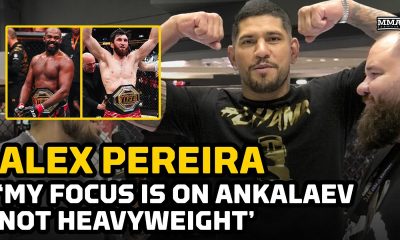
 Professional Sports3 weeks ago
Professional Sports3 weeks agoAlex Pereira responds to rumors of UFC heavyweight title fight with threatening message
-

 College Sports2 weeks ago
College Sports2 weeks agoAlabama Basketball
-

 Professional Sports2 weeks ago
Professional Sports2 weeks agoFrancis Ngannou sends Dana White a message following Jon Jones' shock UFC retirement
-

 Motorsports2 weeks ago
Motorsports2 weeks agoNASCAR This Week – Patriot Publishing LLC
-

 College Sports2 weeks ago
College Sports2 weeks agoA new era of Dickinson hockey begins behind the bench – The Dickinson Press
-
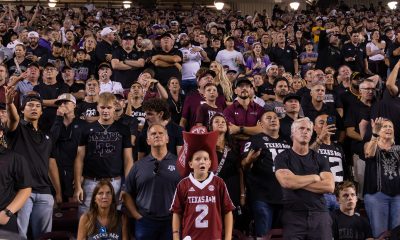
 Sports2 weeks ago
Sports2 weeks agoSEC Conference imposing a fine will create the opposite effect.
































